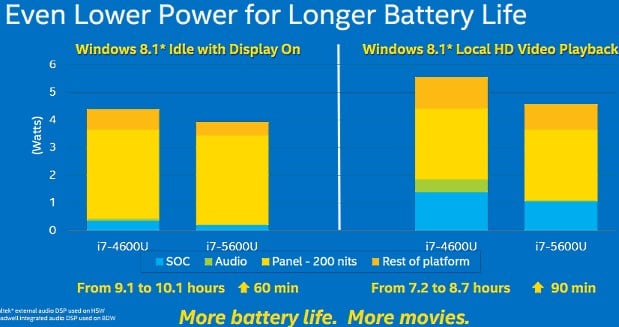Intel Announces 5th Gen Core Mobile Processors, 14nm Cherry Trail At CES
Battery Life, Cherry Trail
Enough about the underlying hardware -- how about those battery life improvements? It turns out that Intel's 1.5 hour battery life claim is going to be fairly conditional:

There are a few things to note here. First, the text actually shows the gain better than the graph does. The problem with graphing wattage, in this case, is the gap between 3.9W and 4.4W is tiny on any reasonable graph, yet that 10% gap can translate into as much as an hour of battery life.
The gains from video playback are also significant, but there's a catch. Most of the gains here are coming from Broadwell's new integrated audio DSP, with SoC gains accounting for the rest. Cutting decode power to the audio chip is definitely a valid way to improve battery life, but without knowing more about the types of audio being decoded or the external Realtek chip that the Haswell platform used, we can't really comment on how representative these figures are of shipping hardware.

The other issue that Intel highlights here, albeit indirectly, is that the display panel now consumes significantly more power than any other component in certain configurations. That's one reason why we may see battery life gains taper in the future -- there's simply not enough power left in that particular component to get huge gains from optimization.
At a guess, we'll see modest battery life improvement of 45 minutes to 2 hours depending on a myriad of configuration factors. That's a solid improvement over Haswell, and it should come while simultaneously delivering improved graphics and a slight boost to CPU performance.
Intel's Cherry Trail:
Today, Intel is also announcing shipment of its Cherry Trail platform, the 14nm Bay Trail die shrink that's been on the roadmap for a little while. As with Haswell-Broadwell, the Bay Trail-Cherry Trail shift is aimed at improving CPU power consumption and overall SoC power characteristics -- though again, we'll see an updated GPU baked into the form factor. The new Broadwell GPU will debut on Cherry Trail as well, and should yield commensurate improvements.
What's odd about this announcement is just how silent Intel is being. While the company is announcing Cherry Trail shipments to customers, it's offering no benchmarks, no statistics, and no additional data. That's surprising, given that Bay Trail, Merrifield, and Moorefield were all key components of Intel's 2014 tablet strategy -- pushing down to 14nm for Atom is still a significant achievement and should allow for some additional performance gains, since the smaller process node should translate directly into higher boost clocks, even if the core architecture remains the same.

There are a few things to note here. First, the text actually shows the gain better than the graph does. The problem with graphing wattage, in this case, is the gap between 3.9W and 4.4W is tiny on any reasonable graph, yet that 10% gap can translate into as much as an hour of battery life.
The gains from video playback are also significant, but there's a catch. Most of the gains here are coming from Broadwell's new integrated audio DSP, with SoC gains accounting for the rest. Cutting decode power to the audio chip is definitely a valid way to improve battery life, but without knowing more about the types of audio being decoded or the external Realtek chip that the Haswell platform used, we can't really comment on how representative these figures are of shipping hardware.

The other issue that Intel highlights here, albeit indirectly, is that the display panel now consumes significantly more power than any other component in certain configurations. That's one reason why we may see battery life gains taper in the future -- there's simply not enough power left in that particular component to get huge gains from optimization.
At a guess, we'll see modest battery life improvement of 45 minutes to 2 hours depending on a myriad of configuration factors. That's a solid improvement over Haswell, and it should come while simultaneously delivering improved graphics and a slight boost to CPU performance.
Intel's Cherry Trail:
Today, Intel is also announcing shipment of its Cherry Trail platform, the 14nm Bay Trail die shrink that's been on the roadmap for a little while. As with Haswell-Broadwell, the Bay Trail-Cherry Trail shift is aimed at improving CPU power consumption and overall SoC power characteristics -- though again, we'll see an updated GPU baked into the form factor. The new Broadwell GPU will debut on Cherry Trail as well, and should yield commensurate improvements.
What's odd about this announcement is just how silent Intel is being. While the company is announcing Cherry Trail shipments to customers, it's offering no benchmarks, no statistics, and no additional data. That's surprising, given that Bay Trail, Merrifield, and Moorefield were all key components of Intel's 2014 tablet strategy -- pushing down to 14nm for Atom is still a significant achievement and should allow for some additional performance gains, since the smaller process node should translate directly into higher boost clocks, even if the core architecture remains the same.






